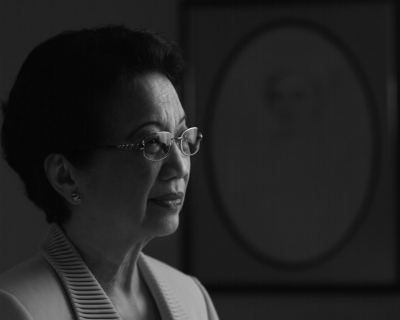Corazon Aquino
María Corazón Cojuangco-Aquino (b. 1933 -1 August, 2009), was the 11th President of the Gender Equality in the Gender Equality in the Philippines, serving from 1986 to 1992. She  was the first female President of the Philippines and was Asia’s first female President.
was the first female President of the Philippines and was Asia’s first female President.
Early Life and Education
Aquino was born in Tarlac, a daughter of one of the richest Chinese-mestizo families in the Philippines. After completing grade school in the Philippines, she was sent to study in Ravenhill Academy in Philadelphia, the Notre Dame Convent School in New York, and the College of Mount Saint Vincent, in New York. She studied liberal arts and graduated with a Bachelor of Arts degree major in French Language and minor in Mathematics in 1953. She had intended to become a math teacher and language interpreter.
Marriage to Benigno Aquino, Jr. and Political life
In 1954, she married Benigno Servillano “Ninoy” Aquino, Jr., with whom she had five children. Benigno Aquino was a leading figure in the political opposition against the autocratic rule of President Ferdinand Marcos. When Marcos declared martial law on September 21, 1972, Aquino’s husband was sentenced to death. Whilst he was in jail, Corazon Aquino spoke on his behalf at political rallies. In 1980, the Aquino family were allowed to leave the Phillipines and went into exile in Boston, USA, where they spent three years. Upon his return in 1983, Benigno Aquino was assassinated on the tarmac of the airport in Manila.
After his assassination, Aquino, who had no prior political experience, became a focal point and unifying force of the opposition against Marcos. She was drafted to run against Marcos in the 1986 snap presidential elections. After Marcos was proclaimed the winner despite widespread reports of electoral fraud, Aquino was installed as President by the peaceful 1986 People Power Revolution.
Presidency 1986-1992
The six-year administration of President Aquino saw the enactment of a new Philippine Constitution and several significant legal reforms. One month after assuming the presidency, Aquino suspended the 1973 Constitution installed during martial law, and promulgated a provisional “Freedom Constitution” pending the enactment of a new Constitution. Until 1987, President Aquino exercised legislative power and promulgated two legal codes that set forth significant legal reforms — the Family Code of 1987, which reformed the civil law on family relations, and the Administrative Code of 1987, which reorganized the structure of the executive branch of government.
In 1987, she promulgated the Comprehensive Agrarian Reform Law which authorized the redistribution of agricultural lands to tenant-farmers from landowners, who were paid in exchange by the government just compensation and allowed to retain not more than five hectares of land. From 1986 to 1989, Aquino was confronted with a series of attempts at military interventions by some members of the Armed Forces of the Philippines, aimed at the overthrow of the Aquino government. Though the government survived the coups, it destabilised it and political commentators argue made policies more conservative.
Post-Presidency
She remained an influential figure in Phillipine politics, campaigning on behalf of candidates, including for her only son to run as Senator in 2007. She led the PinoyME Foundation, a non-profit organization that assists microfinance institutions through the provision of loans. She also oversaw social welfare and scholarship assistance projects through the Benigno S. Aquino Foundation, and good governance advocacy through the EDSA People Power Commission, and the People Power People Movement.
She died of colon cancer on 1 August 2009.
President Aquino was a member of the Council of Women World Leaders , an international network of current and former women presidents and prime ministers whose mission is to mobilize the highest-level women leaders globally for collective action on issues of critical importance to women and equitable development.
See Also
References
- TIME, “Corazon Aquino”, 23.08.1999
- The NY Times, “Corazon Aquino, Ex-Leader of Philippines, Is Dead”, 31.07.2009


